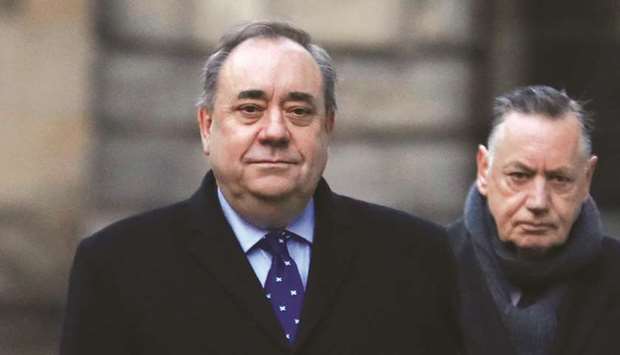Nicola Sturgeon has referred herself to an independent ministerial ethics body after bowing to intense pressure to allow an investigation into her actions in the Alex Salmond sexual harassment case.
The first minister’s move follows her admission that she held a secret meeting with Salmond at her home, in the presence of her government-employed chief of staff and one of Salmond’s advisers, where he briefed her on a Scottish government inquiry into sexual harassment allegations against him.
Opposition parties said that meeting and a subsequent phone call with Salmond were in clear breach of the ministerial code since discussions with outsiders on government business had to be immediately reported to civil servants. Richard Leonard, the Scottish Labour leader, said it was a “grave error of judgment”.
Sturgeon revealed on Thursday it took two months before she raised the meeting and phone call with Leslie Evans, the Scottish government’s top civil servant, and only did so because she was about to meet Salmond for a second time.
Sturgeon advised Evans in writing that legal action by Salmond against the Scottish government was imminent, but denies that was an intervention in the inquiry.
Her spokesman has also refused to confirm or deny that Salmond urged her to intervene at that meeting. The two had a total of three face to face meetings and two phone calls where the investigation was discussed over a 15-week period last summer.
Sturgeon insists her meeting with Salmond was a party matter but she acknowledged yesterday that her claims that she acted in line with the ministerial code needed to be confirmed by independent advisers.
“I have acted appropriately and in good faith throughout, and in compliance with the ministerial code at all times. However, I have reflected carefully and understand that it is also important for parliament and the wider public to be assured of that,” she said.
Her conduct will now be investigated by a two-person panel made up of Dame Elish Angiolini, a former lord advocate, Scotland’s chief prosecutor, and James Hamilton, a former director of public prosecutions in the Republic of Ireland.
Sturgeon said its remit would be carefully drawn up to avoid it compromising a police criminal investigation into the allegations against Salmond. Sturgeon said the interests of the women in the case must be paramount. Salmond denies the allegations of sexual harassment against him.
Sturgeon said: “The fact remains that at the centre of this issue are two women whose complaints could not be swept under the carpet. Any continuing commentary about these issues at this stage – whether from myself, the government or Salmond and his representatives – would only serve to distract from and potentially compromise the proper consideration by the police of the subject matter of their investigations. That is something we will not do.”
Sturgeon had come under pressure to make the referral, which under the Scottish government’s rules can only be made by a first minister, from senior figures in the Scottish National party.
Richard Leonard, the Scottish Labour leader, said Sturgeon had done the right thing by heeding opposition calls for her to refer herself. But there still needed to be a separate Scottish parliament investigation into the entire episode, with Holyrood also given powers to review the ministerial code inquiry.
“Transparency is now absolutely essential in order for the public to have confidence in the first minister and the Scottish government,” he said.
“That is why we should also see a full, public parliamentary inquiry in to what exactly has happened – and I look forward to working constructively with members from other parties this week in order to secure that.”
Kevin Pringle, Salmond’s former spin doctor and a former communications chief for the SNP, yesterday urged her to do so quickly. “The first minister will have to be bold and candid” to allow her to rebuild the party’s reputation, he said.
Pringle was Salmond’s chief spokesman when the then first minister made several self-referrals under the ministerial code. Salmond was exonerated of any breach each time.
Writing in the Sunday Times, Pringle said the “drip-drip of information coming out slowly is poison” for Sturgeon’s government and the SNP. He said it undermined the case for independence if the civil service that would run an independent Scotland could not be trusted.
“Last week was torrid for Sturgeon, and it can’t go on like that,” Pringle said. “She should lead the charge for an independent, external inquiry into the whole business, covering the conduct of ministers and officials. It may be uncomfortable, but it’s the only path to better ground.”

Former first minister of Scotland, Alex Salmond, arrives at the Court of Session in Edinburgh, Scotland.
